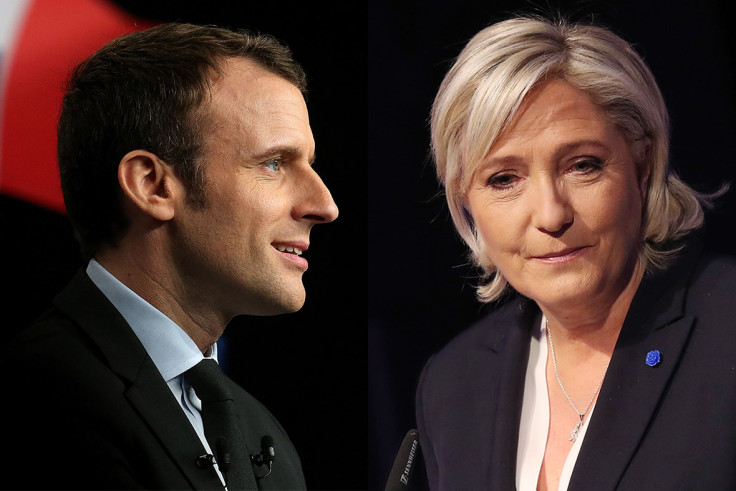En Marche! vs Front National: the overhaul of French politics
Macron's challenge is to hold the centre ground together – and it's not an easy task.
In the long run-up to yesterday's first round of the French presidential election, a great deal was made of the possibility that the far-right candidate, Marine Le Pen, might benefit from some sort of Gallic version of the Brexit/Trump factor. In the event, her performance had more in common with Dutch populist Geert Wilders, promising much, but falling short.
The election is not over by any means and she is still in the running. There is the second-round run-off in two weeks' time and then the general election on June 11 and 18, but Le Pen's smile as she addressed her supporters on Sunday evening did not mask her disappointment at being second and at her score of less than 22%, only 4% more than in 2012.
Let's get this result into perspective. Unlike April 21 2002, when her father's qualification for the second round was a shock, Marine Le Pen's presence in the run-off has been taken as a given throughout the campaign. Only in recent weeks, as her poll scores seemed to falter and Francois Fillon and Jean-Luc Melenchon began to make headway, did it seem possible that we would be looking at anything other than a showdown between Le Pen and Emmanuel Macron. Still, on Sunday morning, one had a sense that ''anything can happen''.
Le Pen's score is not what she would have hoped. The Front National polled 28% nationally in the regional elections in December 2015 (albeit on a much lower turnout), leading Le Pen to declare the FN ''France's first party''. Arguably, it still is, given the disarray of the right-wing Les Republicans (LR) and the Socialists (PS). But she has been overtaken by Emmanuel Macron and his En Marche! movement and that, from her perspective, should not have happened. She will, moreover, have her work cut out to ensure the FN has a decent number of seats in the new National Assembly.
For his part, the task facing Macron is by no means simple. While Fillon and the humiliated PS candidate Benoit Hamon called on their voters to support Macron, the evening's victor still has to hold the centre ground together. There should be enough votes there to see him through, but caution has to be the watchword.
Fillon's gracious acceptance of defeat also marked the end of one of the subplots of this election, as Thatcherism with a French twist lost out to a Blairite vision of consensus. It may or may not be the case that what France ''really needs'' is a good dose of austerity and a hatchet taken to the ''big state''. But that was not enough to persuade enough centre-right voters to put the political scandal surrounding Fillon to one side.

Therein lies something of the Macron revolution. France has been governed from the centre since the 1980s, but alternately by left and right. Now it seems to be heading for a proper centre coalition. But the alarm bell must surely be ringing. With Mélenchon's 19% alongside Le Pen's 22%, there is clearly a great deal of discontent and the satisfied centre is being nibbled away at from both sides. And at the same time, while the LR has suffered what one of its leading figures called its own ''21 April 2002'', the PS is shattered. The next few weeks and months will see an urgent overhaul of the political landscape of France. Oddly enough, the LR might come out of this is better shape than its rivals.
The current situation is not unusual, looking across the longue durée of French politics. When de Gaulle returned to power in 1958, he had no party behind him (and didn't expect to have nor really want one). The Gaullist party was made by his followers, not by de Gaulle. In any case, it wasn't until 1968 that the Gaullists actually had a majority in the National Assembly and they chose to govern with their fellow travellers.
In the 1970s and 1980s we used to talk about a ''bipolar quadrille'', with the Communists and Socialists as one pair, and the Gaullists and the other right-wing parties as the other. A two-party system, with the PS against the LR (or its previous iteration, the UMP) functioned only briefly.
But even before de Gaulle, 1958 and all that, the Fourth Republic was a multiparty regime where the centre held power against the twin threats of Communism on the one hand and Gaullism on the other. The parties in the middle were known as the Third Force. Perhaps the death (in all but name) of the presidentialism of the Fifth Republic will see France return its old ways.
The real test of the shape of things to come will be not so much the second round of the presidential election, but the general election in June.
Dr Paul Smith is Associate Professor in French and Francophone Studies at the University of Nottingham
© Copyright IBTimes 2025. All rights reserved.






















